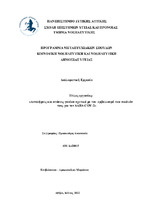| dc.contributor.advisor | Drakopoulou, Marianna | |
| dc.contributor.author | Προσωπάρη, Αναστασία | |
| dc.date.accessioned | 2023-02-08T10:15:28Z | |
| dc.date.available | 2023-02-08T10:15:28Z | |
| dc.date.issued | 2022-07-01 | |
| dc.identifier.uri | https://polynoe.lib.uniwa.gr/xmlui/handle/11400/3655 | |
| dc.identifier.uri | http://dx.doi.org/10.26265/polynoe-3495 | |
| dc.description.abstract | Εισαγωγή: Ο εμβολιασμός των παιδιών μαζί με τα μέτρα προστασίας της δημόσιας
υγείας μπορεί να περιορίσει τη μετάδοση του SARS-COV-2.
Σκοπός: Στόχος της μελέτης ήταν να εντοπιστούν οι στάσεις και οι αντιλήψεις των
Ελλήνων γονέων που επηρεάζουν την πρόθεσή τους να εμβολιάσουν τα παιδιά
τους κατά του COVID-19.
Μέθοδος: Το δείγμα της μελέτης αποτελούνταν από 230 γονείς ανήλικων παιδιών
στους οποίους χορηγήθηκε το ερωτηματολόγιο δημογραφικών χαρακτηριστικών
και ανάλυση της κλίμακας «Γονική αποδοχή του δωρεάν εμβολιασμού COVID19 για παιδιά ηλικίας κάτω των 18 ετών».
Αποτελέσματα: Η πλειοψηφία των συμμετεχόντων ήταν γυναίκες (70,4%), ηλικίας
41-50 ετών (43,3%), έγγαμες (86,5%), με πανεπιστημιακό πτυχίο (63,5%). Η
γονική αποδοχή του δωρεάν εμβολιασμού κατά της covid-19 ήταν μέτρια (36,6
%), ενώ ένα μικρό ποσοστό (23,9%) είχαν ήδη εμβολιάσει τα παιδιά τους.
Σύμφωνα με την ανάλυση απλής λογιστικής παλινδρόμησης, το γυναικείο φύλο
(προσαρμοσμένη αναλογία πιθανοτήτων [AOR] 3,05, 95% CI 1,43-6,47,p=0,004), το υψηλότερο μορφωτικό επίπεδο ([AOR] 2,66, 95% CI 1,21-5,84,
p=0,015), το ιστορικό εμβολιασμού εποχικής γρίπης ([AOR] 2,08, 95% CI 1,09-
3,9). 0,026) και ο αυτοαναφερόμενος εμβολιασμός ([AOR] 17,38, 95% CI 2,29-
131,86, p=0,006) συσχετίστηκαν σημαντικά με την αποδοχή του εμβολιασμού
από τους γονείς. Η αύξηση των αντιλήψεων θετικής στάσης συσχετίστηκε με
αυξημένη πιθανότητα αποδοχής από τους γονείς του εμβολιασμού κατά του
COVID-19.
Συμπεράσματα: Η μέτρια γονική αποδοχή του εμβολιασμού ανηλίκων παιδιών κατά
του COVID 19 και η συσχέτισή του με τις αντιλήψεις και τις στάσεις των γονέων
που βρέθηκαν στην παρούσα μελέτη, υποδηλώνουν ότι είναι σημαντικό να
αυξηθεί η ευαισθητοποίηση των γονέων σχετικά με τον εμβολιασμό των παιδιών
τους και οι πολιτικές δημόσιας υγείας πρέπει να εστιάσουν στην ενίσχυση των
θετικών στάσεων, στην αύξηση της κοινωνικής συναίνεσης διευκολύνοντας την
επιθυμητή συμπεριφορά. | el |
| dc.format.extent | 90 | el |
| dc.language.iso | el | el |
| dc.publisher | Πανεπιστήμιο Δυτικής Αττικής | el |
| dc.rights | Αναφορά Δημιουργού - Μη Εμπορική Χρήση - Παρόμοια Διανομή 4.0 Διεθνές | * |
| dc.rights.uri | https://creativecommons.org/licenses/by-nc-sa/4.0/deed.el | * |
| dc.subject | Εμβολιασμός | el |
| dc.subject | Παιδιά | el |
| dc.subject | Γονείς | el |
| dc.subject | Στάσεις | el |
| dc.subject | Πρόθεση | el |
| dc.subject | Covid 19 | el |
| dc.subject | Vaccination | el |
| dc.subject | Children | el |
| dc.subject | Parents | el |
| dc.subject | Attitudes | el |
| dc.subject | Intention | el |
| dc.title | Αντιλήψεις και στάσεις γονέων σχετικά με τον εμβολιασμό των παιδιών τους για τον SARS-COV-2. | el |
| dc.title.alternative | Perceptions, Attitudes and Intentions of Greek Parents Toward their Underaged Children Vaccination against SARS-COV-2 | el |
| dc.type | Μεταπτυχιακή διπλωματική εργασία | el |
| dc.contributor.committee | ADAMAKIDOU, THEODOULA | |
| dc.contributor.committee | Mastrogiannis, Dimos | |
| dc.contributor.faculty | Σχολή Επιστημών Υγείας & Πρόνοιας | el |
| dc.contributor.department | Τμήμα Νοσηλευτικής | el |
| dc.contributor.master | Κοινοτική Νοσηλευτική και Νοσηλευτική Δημόσιας Υγείας | el |
| dc.description.abstracttranslated | Background: Vaccination of children along with public health protection measures can
limit transmission of SARS-COV-2.
Objective: The aim of the study was to identify the attitudes and perceptions of Greek
parents that affect their intention to vaccinate their children against COVID-19.
Methods: The sample of the study consisted of 230 parents of underaged children who
were administered a demographic characteristics questionnaire and the “Parental
Acceptability of Free COVID-19 Vaccination for Children Under the Age of 18 Years”
scale.
Results: The majority of participants were females (70.4%), aged 41-50 years old
(43.3%), married (86.5%), with university degree (63.5%). The prevalence of parental
acceptability of free covid-19 vaccination was moderate (36.6 %) and a small
percentage (23.9%) had already vaccinated their children. According to the univariate
logistic regression analysis, female gender (adjusted odds ratio [AOR] 3.05, 95% CI1.43-6.47, p=0.004), highest educational level ([AOR] 2.66, 95% CI 1.21-5.84,
p=0.015), history of seasonal influenza vaccination ([AOR] 2.08, 95% CI 1.09-3.98,
p=0.026) and self-reported vaccination ([AOR] 17.38, 95% CI 2.29-131.86, p=0.006)
were significantly associated with parental acceptability of vaccination. Increasing
positive attitude perceptions was associated with an increased likelihood of parental
acceptability of COVID-19 vaccination.
Conclusion: The moderate parental acceptability of underaged children vaccination
against COVID 19 and its association with perceptions and attitudes of parents found
in the present study, indicate that it is important to raise awareness of parents about the
vaccination of their children and public health policies need to focus on strengthening
positive attitudes, increasing social consensus and facilitating the desired behavior. | el |


